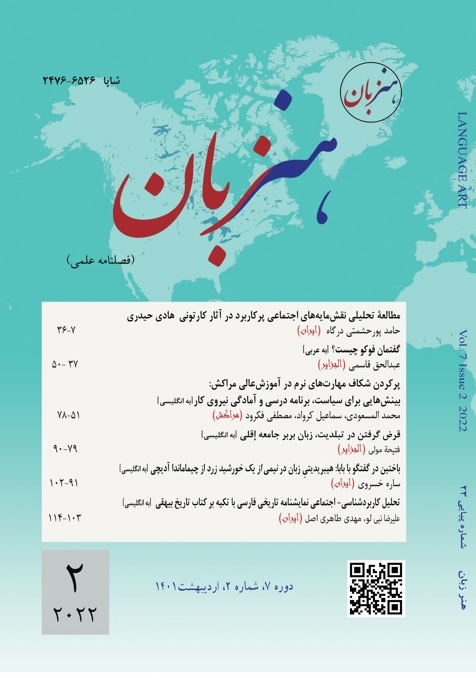تحلیل کاربردشناسی- اجتماعی نمایشنامه تاریخی فارسی با تکیه بر کتاب تاریخ بیهقی
DOI::
https://doi.org/10.22046/LA.2022.12کلمات کلیدی:
تحلیل کاربردشناسی, کنش گفتاری, کنش غیر مستقیم, الگوی نابجا, تحلیل کاربردشناسی اجتماعی, روایت بیهقی از حسنک وزیرچکیده
كاربردشناسي یکی از حوزههای زبانشناسی است که با آن معناي «تلويحي و اغراض پنهاني» جمله میسر میگردد. پاره گفتارها یکی از موضوعات کاربرد شناسی میباشند که به منظور اجرای موفق آنها گوینده بایستی شرایطی مانند شروط مقدماتی، محتوا و صداقت را به کار گیرد. در برخی اوقات گویندگان با سرپیچی از شرایط مذکور مقاصد پنهانی خود را اظهار میکنند. یکی از آثار ادبی که وجوه نمایشی در آن بسیار مشهود است تاریخ بیهقی میباشد. بدین منظور نگارندگان این مقاله ضمن توضیح «شرایط به جا» نشان میدهند چگونه شخصیتهای داستان با سرپیچی از این شروط مقاصد خود را به صورت تلویحی بیان میکنند .نمونه دادهها از داستان حسنک وزیر گرفته شده است. این داستان با مرگ سلطان محمود غزنوی آغاز میشود و با نابودی یک وزیر مقتدر پایان مییابد. پژوهش حاضر با اتخاذ تحليل کاربردشناسی از دیالوگهای داستان حسنک وزیر اين موضوع را تبیین مینماید كه چگونه شخصيتها در حين توليد پاره گفتارها، اهداف ارتباطي خود را شکل ميدهند. نتایج تحقیقات نشان داد که به دلیل احتیاط، ترس و برخی طرحوارههای فرهنگی، گویندگان از «راهبردهای نابه جا» استفاده میکنند تا ضمن آشنایی خواننده با وضعیت دربار، این موضوع را یادآوری کنند که هیچ کسی در آن زمان حق آزادی بیان نداشته است.
مراجع
Allott, N. (2010). Key terms in pragmatics: Bloomsbury Publishing.
Al-Mulk, N. (2002). The Book of Government, Or, Rules for Kings: The Siyar Al-Muluk, Or, Siyasat-nama of Nizam Al-Mulk: Psychology Press.
Austin, JL. (1975). How to do things with words: Oxford university press.
Beeman, WO. (1986). "Language, status, and power in Iran: Indiana University Press.
Beeman, WO. (2020). Ta’ārof–the key to Iranian social behavior. Persian Linguistics in Cultural Contexts: Routledge; pp. 44-60.
Beyhaqi, A. (2011). The History of Beyhaqi:(the History of Sultan Masʻud of Ghazna, 1030-1041: Ilex Foundation.
Bublitz, W., Norrick, NR. (2011). Foundations of pragmatics: Walter de Gruyter.
Burke, M. (2017). The Routledge handbook of stylistics: Routledge.
Cuddon, JA. (2012). A dictionary of literary terms and literary theory: John Wiley & Sons.
Cummings, L. (2010). The Routledge pragmatics encyclopedia: Routledge.
Hamid, M.N.S. (2019). Reading History in Historical Literature: An Analysis of the Historical Novel Kalbu Qalha. Malay Literature, 32(1), pp.16-36.
Haryanti, RD. (2016). A sociopragmatic analysis of interruptions by the male characters in marc cherrys desperate housewives season 1 TV series: Yogyakarta state university.
Iranica, E. (2019). Encyclopaedia iranica. Center for Iranian Studies-Columbia University. 1985;7(08).
Kazemimojaveri, E. (2016). A short introduction to Iranian drama. Mimesis Journal Scritture della performance,(5, 1):64-78.
Katouzian, H. (2012). Iranian history and politics: The dialectic of state and society: Routledge.
Leech, G. (2016). Principles of pragmatics: Routledge.
Lee, S. (2012). A pragmatic analysis of defamation and slanderous remarks. Ene.;37(2):401-16.
Levy, R. (1951). A Mirror for Princes the Qabus Nama.
Lu, F.M. (2004). A Pragmatic Account of Pride and Prejudice. MA thesis, Guangxi University:7-25.
Moradi, HG. (2017). Despotism in Iran: Dorrance Publishing.
Mulyanto, M., Fabiola, MPDPD, Kurnia, D. (2019). Pragmatic Analysis of the Dialogues in Arthur Miller’s Drama “The Crucible”.
Mulyanto, Slamet Setiawan, and Fabiola D. Kurnia. (2019). "Pragmatic Analysis of the Dialogues in Arthur Miller’s Drama “The Crucible”." Journal of Literature, Languages and Linguistics 61, 53-67.
Sharifian, F. (2005). The Persian cultural schema of shekasteh-nafsi: A study of compliment responses in Persian and Anglo-Australian speakers. Pragmatics & Cognition. 2005;13(2):337-61.
Tayebi, T. (2018). Implying an impolite belief: a case of tikkeh in Persian. Intercultural Pragmatics.;15(1):89-113.
Young, LE. (2019). The psychology of state repression: Fear and dissent decisions in Zimbabwe. American Political Science Review.;113(1):140-55.
Yule, G. (1996). Pragmatics. Oxford: Oxford University Press.
##submission.downloads##
چاپ شده
ارجاع به مقاله
شماره
نوع مقاله
مجوز
حق نشر 2022 MAHDI TAHERIASL

این پروژه تحت مجوز بین المللی Creative Commons Attribution 4.0 می باشد.
فصلنامه هنر زبان یک مجله دسترسی آزاد است و مقالات پس از پذیرش در دسترس عموم قرار می گیرند و استفاده از آن با ذکر منبع آزاد است
